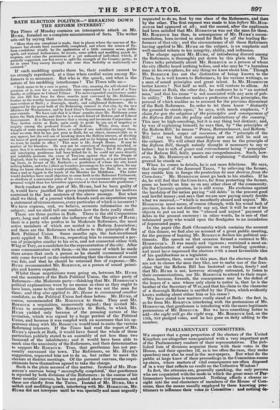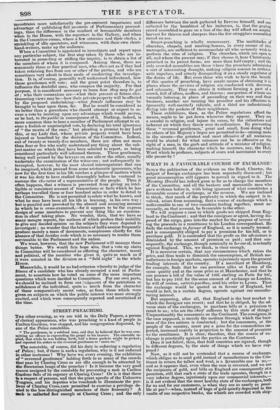PARLIAMENTARY COMMITTEES.
WE suspect that a great proportion of the electors of the United Kingdom are altogether unacquainted with a very important part of the Parliamentary conduct of their representatives. The pub- lished lists of divisions acquaint them with their votes in the House, and their speeches (if, as is too often the ease, they make speeches) may also be read in the newspapers. But what do the public at large know of their proceedings in the Committee-rooms up stairs, where matters of vital consequence are often disposed of in a way that reflects no credit on the Collective Wisdom? In fact, the attornies are, generally speaking, the only persons who are acquainted with the mode in which the great mass of Par- liamentary business is transacted. Nothing affords a clearer in- sight into the real characters of members of the House of Com- mons, than the means usually employed by these knowing prac- titioners to influence their votes in Committee ; and nothing de-
. monstrates more satisfactorily the pre-eminent importance and advantage of publishing full accounts of Parliamentary proceed-
ings, than the difference in the conduct of honourable members when in the House, with the reporters in the Gallery, and when in the Committee-rooms, where a few attornies and their clerks, a sprinkling of idle spectators, and witnesses, with their own short- hand-writers, make up the audience.
When a Committee is appointed to investigate and report upon any particular subject, the first step taken by those who are in- terested in promoting or stiffing the inquiry, is to obtain a list of the members of whom it is composed. Among these, there are commonly three or four practical men, who often act as if they had
taken retaining fees from one or other of the parties, and who are sometimes very adroit in their mode of conducting the investiga- tion. It is, of course, generally well understood beforehand, how these gentlemen will vote; and the great point therefore is, to influence the doubtful ones, who compose the majority. For that purpose, it is considered necessary to learn how they may be got at; who their connexions are—what their present or future elec- tioneering views may be—how their private property will be affected by the proposed undertaking—what female influence may be brought to bear upon them, &c. But he would be considered as no better than a greenhorn who should attempt or expect to se- cure a vote by insisting upon any advantage which would accrue, or be lost, to the public in consequence of it. Nothing, indeed, is more common than to hear a member of Parliament attempt to ex cuss a foolish or unprincipled vote, by declaring his total ignorance of " the merits of the case;" but pleading a promise to my Lord this, or my Lady that, whose private property would have been injured or benefited by the decision of the Committee. Indeed, out of twenty or twenty-five members, there are often not more than four or five who really understand any thing about the sub- ject matter on which they have been selected to report, as being considered particularly well informed thereon. These gentlemen, being well primed by the lawyers on one side or the other, usually undertake the examination of the witnesses ; not unfrequently in- terrupted, however, by the most absurd interrogatories that can " . be imagined, which proceed from some aristocratic ignoramus, who now for the first time in his life catches a glimpse of matters which it was his duty to have studied thoroughly before he ventured to assume the character of a representative of the people. Thus it often happens, that a witness is prevented from giving an intel- ligible or consistent account of transactions or facts which he has perhaps travelled three or four hundred miles in order to detail to the Committee. He is not permitted to relate what he knows, and what he may have been all his life in learning, in his own way ; but is puzzled and provoked by the absurd and annoying manner in which he is cross-examined,—for it appears to be the express design of some members to prevent any thing like an examina- tion in chief taking place. No wonder, then, that we have so many meagre reports, the authors of which profess their inability to give any decided opinion on the subjects they were deputed to investigate ; no wonder that the labours of half a session frequently produce merely a mass of documents, conspicuous chiefly for the absence of that lucidus ordo which is so necessary to render them serviceable to the Parliament and the nation.
We trust, however, that the new Parliament will manage these things better. We would fain hope also, that a vote up stairs in Committee will be considered as affecting the character, moral and political, of the member who gives it, quite as much as if it were counted in the division on a "field night" in the whole House.
Meanwhile, it would be no bad criterion whereby to judge of the fitness of a candidate who has already occupied a seat in Parlia- ment, to ascertain how he voted on some of the more important questions which were decided in Committees. For our own parts, we should be inclined to form our udguient of the patriotism or selfishness of the individual, quite as much from the character of these comparatively secret votes, as from those which were given-on subjects on which the public interest was more strongly excited, and which were consequently reported and scrutinized at the time.




























 Previous page
Previous page